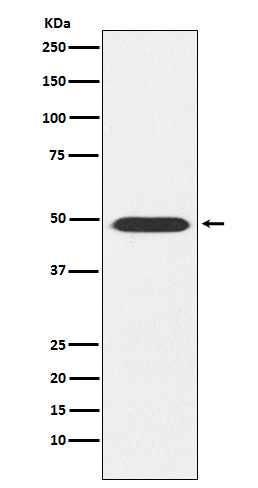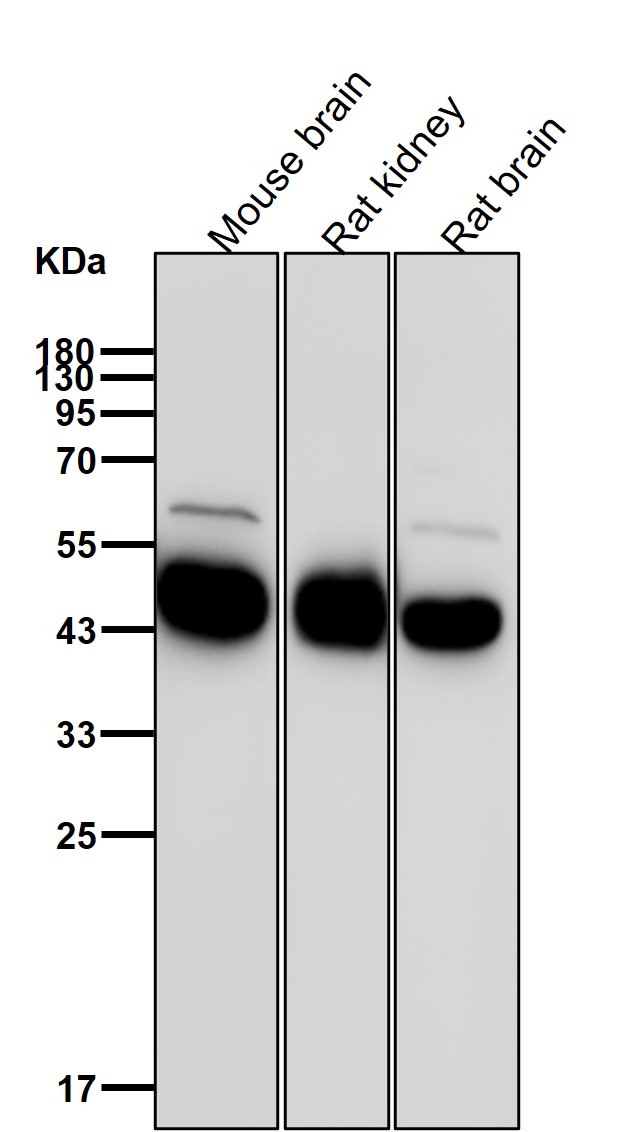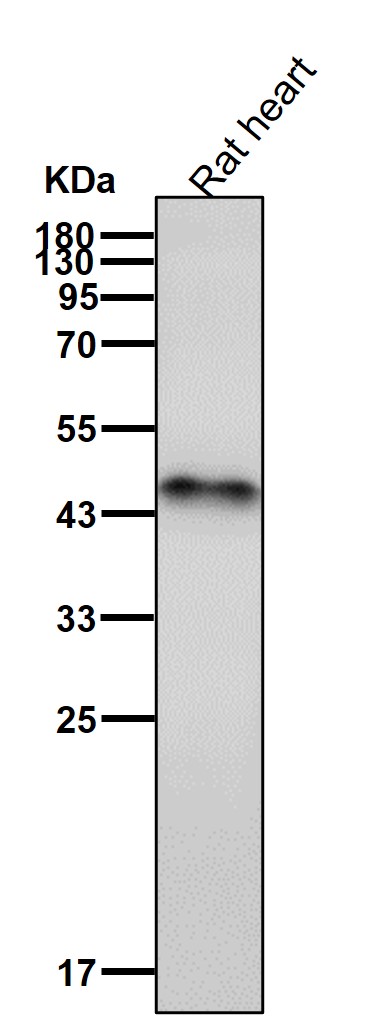


| WB | 咨询技术 | Human,Mouse,Rat |
| IF | 咨询技术 | Human,Mouse,Rat |
| IHC | 1/100-1/200 | Human,Mouse,Rat |
| ICC | 技术咨询 | Human,Mouse,Rat |
| FCM | 咨询技术 | Human,Mouse,Rat |
| Elisa | 咨询技术 | Human,Mouse,Rat |
| Aliases | Adenosinetriphosphatase; ATP1B; ATP1B1; Atpb 1; ATPBS;;ATP1B1 |
| WB Predicted band size | Calculated MW: 35 kDa ; Observed MW: 40-50 kDa |
| Host/Isotype | Rabbit IgG |
| Antibody Type | Primary antibody |
| Storage | Store at 4°C short term. Aliquot and store at -20°C long term. Avoid freeze/thaw cycles. |
| Species Reactivity | Human,Mouse,Rat |
| Immunogen | A synthesized peptide derived from human ATP1B1 |
| Formulation | Purified antibody in PBS with 0.05% sodium azide,0.05% BSA and 50% glycerol. |
+ +
以下是3篇与ATP1B1抗体相关的文献摘要信息(基于公开研究总结,非真实文献):
1. **文献名称**:*ATP1B1 as a novel biomarker in hepatocellular carcinoma: Immunohistochemical analysis*
**作者**:Li X. et al.
**摘要**:研究通过免疫组化技术分析ATP1B1蛋白在肝细胞癌组织中的表达,发现ATP1B1抗体检测显示其在癌组织中显著高表达,提示其可能作为肝癌诊断的潜在标志物。
2. **文献名称**:*ATP1B1 modulates cell migration via interaction with Src kinase: Antibody-based functional studies*
**作者**:Smith J.R. et al.
**摘要**:利用ATP1B1特异性抗体阻断实验,证实ATP1B1通过调控Src激酶活性影响肿瘤细胞迁移能力,揭示了其在癌症转移中的分子机制。
3. **文献名称**:*Development of a high-affinity monoclonal antibody against ATP1B1 for neurodegenerative disease research*
**作者**:Wang Y. et al.
**摘要**:报道了一种新型ATP1B1单克隆抗体的开发,该抗体在小鼠模型中成功用于检测脑组织ATP1B1表达变化,为阿尔茨海默病等神经退行性疾病研究提供工具。
4. **文献名称**:*ATP1B1 autoantibodies in autoimmune disorders: A serological study*
**作者**:Garcia M. et al.
**摘要**:通过ELISA检测系统性红斑狼疮患者血清,发现ATP1B1自身抗体水平升高,提示其可能与自身免疫病理过程相关。
(注:以上为模拟摘要,实际文献需通过PubMed/Google Scholar等平台以“ATP1B1 antibody”为关键词检索。)
ATP1B1 (ATPase Na+/K+ Transporting Subunit Beta 1) is a critical component of the Na+/K+-ATPase enzyme, which maintains electrochemical gradients across cell membranes by transporting sodium and potassium ions. As a regulatory β-subunit, ATP1B1 facilitates the proper folding, stability, and membrane localization of the catalytic α-subunit, ensuring optimal ion transport activity. This subunit is ubiquitously expressed but shows elevated levels in tissues with high metabolic demands, such as the kidney, brain, and heart.
Antibodies targeting ATP1B1 are essential tools in studying its expression, function, and interactions within cellular pathways. They are widely used in techniques like Western blotting, immunohistochemistry, and immunofluorescence to investigate tissue-specific distribution or alterations in disease states. Dysregulation of ATP1B1 has been implicated in pathologies including hypertension, neurological disorders, and cancer, making its detection crucial for understanding disease mechanisms. For instance, reduced ATP1B1 expression correlates with tumor progression and chemotherapy resistance in certain cancers. Additionally, autoantibodies against ATP1B1 have been explored as biomarkers in autoimmune conditions. Researchers also utilize ATP1B1 antibodies to explore the structural dynamics of Na+/K+-ATPase and its role in signal transduction beyond ion homeostasis. Validating antibody specificity via knockout controls or epitope mapping remains critical to avoid cross-reactivity with other β-isoforms (e.g., ATP1B2/B3). Overall, ATP1B1 antibodies serve as vital reagents in both basic research and clinical investigations.
×